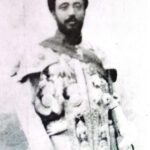UTHMAN ABU BAKR DIQNA
- 6 Min Read
Uthman Abu Bakr Diqna “‘Uthman Digna” (c.1840-1926) was one of the ‘Amils (Provincial Governors) of the Mahdist State in the Sudan (1885-1898). His ancestors were Kurds who came to Suakin from Diar Bakr (Northern parts of Modern Iraq) during the time of Sultan Selim I of Turkey (1512-1520) who conquered Egypt in 1517. They settled in the Eastern Sudan near Suakin and intermarried with the Hadendowa (one of the Beja Tribes of Eastern Sudan). The Dignai family (the family of ‘Uthman Digna) was the result of such an intermarriage.
A good number of the Dignai family were merchants who traded between Suakin on the West Coast of the Red Sea, and the Arabian port of Jedah, the merchandise mainly being slaves. Uthman Digna himself was born and brought up in Suakin where he worked as a trader between Suakin and Arabia, dealing mainly in slave trade.
The British Government, assuming a philanthropic intention, directed a portion of its fleet to the Red Sea to hurry the slave dealers and put an end to their activities. One of its ships, by 1877, fell upon a convoy of slaves which belonged to the Dignai family. The merchandise was confiscated, the family’s trade activities with Jedah prohibited, and ‘Uthman Digna, together with two of his brothers (Ali and Omar) were imprisoned for a short time. This interference filled the Dignai family with great bitterness towards the British Authorities. Ultimately, events played a great part in helping Uthman Digna, not only to express his hatred of the British, but also to raise his sword against them.
In 1881 Arabi Pasha and the army in Egypt rebelled against the atrocities of the Khedive and what they called European intervention – mainly British – in their internal affairs. The Arabist uprising was local and short-lived and therefore did not give ‘Uthman Digna the opportunity to create the movement which he contemplated in Suakin. In any case, the Arabist’s fiasco resulted in the British occupation of Egypt in 1882.
In the meantime, Mohamad Ahmad Ibn Abdullahi (c.1844-1885), the Mahdi of the Sudan, (the Righteous one) had announced his divine mission, gathered a considerable following, and declared the Jihad (Holy War) against the Infidels (Turko – Egyptian Rulers). The result of the Mahdi’s religion revolution was the overthrow of the Turkish regime and the establishment of the Mahdist rule and Mahdist State (1865—1898).
The Mahdist revolution offered ‘Uthman Digna the chance he had been waiting for. He joined the Mahdi after the latter had captured the town of EL-Obeid (in Western Sudan) on 17 January 1883. The Mahdi was also in need of somebody to start the revolution in Eastern Sudan and block the British advance from Suakin. Thus he found in ‘Uthman Digna a suitable person to carry out this mission, and appointed him Governor and Emir (General) for the East and supplied him with a number of letters to the notables and people of Suakin.
The first years of ‘Uthman Digna were quite a success; he aroused the Beja tribes against the authorities and inflicted a number of defeats on the Government troops dispatched against him, particularly at the battles of EL-Teb (November 4., 1883) and Tamai (December 2, 1883).
However, the main task of ‘Uthman Digna was to capture Suakin. But this proved to be impossible for him, and Suakin remained the only town in the Sudan which did not capitulate to the Mahdists. The failure to take it does not seem to be due to the inefficiency of ‘Uthman Digna.
On the one hand, the town was a fortified stronghold which the Mahdists had neither the art of warfare nor the weapons to break; on the other, the British occupation of Egypt had given them the chance to build up a new army and a new administration. They were able not only to check the activities of ‘Uthman Digna but also to expel him from the region of Suakin by February 1891.
As an official of the state ‘Uthman Digna was very loyal to the Mahdi and the Khalifa Abdullahi (successor of the Mahdi) after him. In fact he remained loyal to the Mahdist cause until his death. The Khalifa trusted him fully and in 1897 entrusted him, together with the Emir Mahmoud Ahmad, with the leadership of the Mahdist army to meet Kitchener Pasha at the head of an Egyptian expedition to reconquer the Sudan.
The Mahdist army was defeated at the battle of the Atbara on April 8, 1898, and ‘Uthman Digna, with a few of his Ansar (followers of the Mahdi), fell back on Omdurman (Mahdist capital) where he took part in the battle of Omdurman on September 2, 1898.
The Mahdists were once more defeated and this defeat marked the end of the Mahdist State. For a year ‘Uthman Digna followed the Khalifa who tried to gather his shattered troops and regain his capital. But the Khalifa’s dream was put to an end when he was defeated and killed at the battle of Gedid on November 24, 1899.
‘Uthman Digna very skillfully escaped death and this time made his way to Eastern Sudan. He tried to rouse the tribes again but they refused. He then asked their chiefs to help him escape to Arabia and they promised to do so. But, with the characteristic intrigue of an Arab, the chief of the Gemilab, (a section of the Hadendowa) Sheikh Ali Omar or, betrayed him and revealed his hiding place to the Government.
On 13 January 1900 ‘Uthman Digna was captured and taken to Damietta prison in Egypt. His stay there did not last long because the weather did not suit him. But the British Government feared that uneasiness among his former victims and unrest among his former followers might be caused by the presence of ‘Uthman Digna in the Sudan, and it was therefore thought inadvisable to transfer him at that time (April 1908).
However, on 20th December, 1908 the Sudan Government (Anglo-Egyptian) considered that the time had come when it was possible to carry out their original Intention of transferring ‘Uthman Digna from Damietta to Halfa, (where he stayed for the rest of his life). (Central Records Office, Khartoum, Intelligence Reports: part LXX, Nos. 44,122, “Affairs of Egypt and the Sudan”).
In 1924 ‘Uthman Digna, an old and harmless man, was allowed to proceed to Mekka as a Pilgrim; and two years later (1926) he died peacefully and was buried at Halfa. On August 31, 1964 the body of ‘Uthman Digna, to prevent its being submerged under the High Dam waters, was transferred to the Eastern Sudan and reburied on the top of a hill not far away from Erkawit Summer resort, in the region which he dominated for several years.
One might say that had it not been for the Mahdist Revolution ‘Uthman Digna would not have been so famous. But, in order not to underestimate his personality’, one might also add that he was an intelligent man who knew how to take advantage of events. The position which ‘Uthman Digna held in the Mahdist State, together with his loyalty, efficiency, and ability made him a hero, not only to his friends, but also to his enemies.
SALAH TIGANI HUMOUDI





